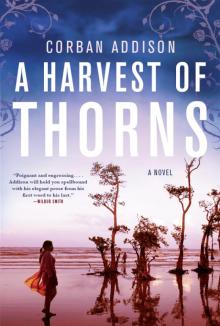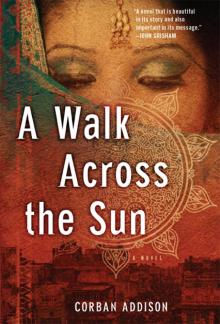- Home
- Corban Addison
A Walk Across the Sun
A Walk Across the Sun Read online
A Walk
Across
the Sun
A Novel
BY CORBAN ADDISON
SILVEROAK BOOKS is a trademark of Sterling Publishing Co., Inc.
© 2012 by Regulus Books, LLC
Excerpts of Psalm 74:20, Ezekiel 28:16 and James 4:2 from The Holy Bible, English Standard
Version® (ESV®). Copyright © 2001 by Crossway, a publishing ministry of Good News Publishers.
Used by permission. All rights reserved.
Excerpt of Psalm 88:18 from The Holy Bible, New International Version®, NIV®. Copyright © 1973,
1978, 1984, 2011 by Biblica, Inc.™ Used by permission.
All rights reserved worldwide.
Excerpt from Maximum City by Suketu Mehta. Copyright © 2004 by Suketu Mehta.
Vintage Books, a division of Random House, Inc.
Excerpt from The Ramayana by R.K. Narayan. Copyright © 1972 by R.K. Narayan. Penguin Books,
a division of the Penguin Group.
All rights reserved. No part of this publication may be reproduced, stored in a retrieval system,
or transmitted, in any form or by any means, electronic, mechanical, photocopying, recording,
or otherwise, without prior written permission from the publisher.
ISBN 978-1-4027-9280-9 (hardcover)
ISBN 978-1-4027-9281-6 (ebook)
Library of Congress Cataloging-in-Publication Data
Addison, Corban, 1979-
A walk across the sun : a novel / by Corban Addison.
p. cm.
ISBN 978-1-4027-9280-9 (alk. paper)
1. Sisters—India—Fiction. 2. Teenage girls—India—Fiction. 3. Tsunamis—Coromandel Coast (India)—Fiction. 4. Disaster victims—India—Fiction. 5. Human trafficking—India—Fiction. 6. Child trafficking victims—Fiction. 7. Tamil Nadu (India)—Fiction. 8. Atlanta (Ga.)—Fiction. I. Title.
PS3601.D465W35 2012
813’.6—dc22
2011022367
For information about custom editions, special sales, and premium and corporate purchases, please contact Sterling Special Sales at 800-805-5489 or [email protected].
2 4 6 8 10 9 7 5 3 1
www.sterlingpublishing.com
For the uncountable number of souls
held captive in the sex trade.
And for the heroic men and women across the globe
working tirelessly to win their freedom.
The dark places of the land are full of the habitations of violence.
—ASAPH THE PSALMIST
If we have no peace, it is because we have forgotten that we belong to one another.
—MOTHER TERESA OF CALCUTTA
Table of Contents
Part One
Chapter 1
Chapter 2
Chapter 3
Chapter 4
Chapter 5
Chapter 6
Chapter 7
Chapter 8
Chapter 9
Part Two
Chapter 10
Chapter 11
Chapter 12
Chapter 13
Chapter 14
Chapter 15
Chapter 16
Chapter 17
Chapter 18
Part Three
Chapter 19
Chapter 20
Chapter 21
Chapter 22
Chapter 23
Chapter 24
Chapter 25
Chapter 26
Chapter 27
Chapter 28
Part Four
Chapter 29
Chapter 30
Chapter 31
Chapter 32
Chapter 33
Epilogue
Afterword
Acknowledgments
A Note to Book Club Readers
Part One
Chapter 1
Children have their play on the seashore of worlds.
—RABINDRANATH TAGORE
Tamil Nadu, India
The sea was quiet at first light on the morning their world fell apart. They were sisters—Ahalya the older at seventeen and Sita two years her junior. Like their mother before them, they were children of the sea. When their father, a software executive, moved the family from the plains of Delhi to Chennai on the Coromandel Coast, it felt to Ahalya and Sita like a homecoming. The sea was their friend, its pelicans and pomfrets and crested waves their companions. They never believed the sea could turn against them. But they were young and understood little of suffering.
Ahalya felt it when the earth shook in the dawn twilight. She looked at Sita sleeping in the bed beside her and wondered why she didn’t awaken. The tremors were violent but ceased quickly, and afterward she wondered if they had come in a dream. No one stirred in the house below. It was the day after Christmas, a Sunday, and all India was asleep.
Ahalya snuggled into her blanket, inhaled the sweet, sandalwood scent of her sister’s hair, and drifted off to visions of the peacock-blue salwar kameez her father had given her to wear to the conservatory in Mylapore that evening. It was December and the Madras Music Season was in full swing. Their father had bought them tickets to a violin concerto at eight o’clock. She and Sita were both students of the violin.
The household awoke in stages. At a quarter past seven, Jaya, the family’s longtime housekeeper, swaddled herself in a sari, retrieved a small jar of limestone powder from the bureau at the foot of her bed, and went to the front porch. She swept the earth beyond the threshold with a stiff-bristled broom and placed dots of the white powder on the ground. She connected the dots with elegant lines and traced the star shape of a jasmine flower. Satisfying herself, she placed her hands together, palms flat, and whispered a prayer to Lakshmi, the Hindu goddess of fortune, for an auspicious day. The kolam ritual complete, she went to the kitchen to prepare the morning meal.
Ahalya woke again when the sunlight streamed through the curtains. Sita, always an early riser, was nearly dressed, her sable hair shiny and damp from a shower. Ahalya watched her sister apply her makeup in front of a small mirror and smiled. Sita was a fine-boned girl blessed with the delicate features and wide, expressive eyes of their mother, Ambini. She was slight for her age, and the magic of puberty had yet to transform her body into the figure of a woman. As a result, she was self-conscious about her appearance, despite regular reassurances from Ahalya and Ambini that time would bring about the changes she so desired.
Partly to keep pace with Sita and partly to avoid being late for breakfast, Ahalya dressed hurriedly in a yellow pantsuit, or churidaar, and matching scarf. She slipped on bangles and anklets and completed the ensemble by fastening a necklace around her neck and placing a delicate jeweled bindi on her forehead.
“Ready, dear?” Ahalya asked Sita in English. It was a rule in the Ghai household that the girls could speak Hindi or Tamil only if spoken to by an adult in that language. Like all Indians privileged to rise into the ranks of the upper middle class, their parents dreamed of sending them to university in England and firmly believed that a mastery of English was the likeliest ticket to Cambridge or Oxford. The convent school where the girls boarded taught Hindi—the national language—and Tamil—the indigenous tongue of Tamil Nadu—along with English, but the convent sisters preferred to speak English, and the girls never quibbled with the rule.
“Yes,” Sita said wistfully, casting a fading glance toward the mirror. “I suppose.”
“Oh, Sita,” Ahalya chided her, “a frown will not endear you to Vikram Pillai.”
The comment had the effect Ahalya intended. Sita’s face brightened at the mention of the family’s plans for the evening. Pillai was her favorite violinist.
“Do you think we’ll get to meet him?” Sita asked. “The line after the show is always so long.”
“Ask Baba,” Ahalya said, thinking of the surprise she and her father had planned for Sita—and had succeeded in keeping secret. “You never know with his connections.”
“I’ll ask him at breakfast,” Sita said and disappeared through the door and down the stairs.
Chuckling to herself, Ahalya followed Sita to the living room. Together, the girls performed their puja, or morning worship, before the family idols of Ganesh, the elephant god of luck, and Rama, avatar of Vishnu, who stood on an altar in a corner of the room. Like most members of the merchant caste, the Ghais were predominantly secular and visited a temple or shrine only on rare occasions when seeking a boon from the gods. However, when the girls’ grandmother came to visit, the incense sticks were lit and the puja prepared, and everyone—small and great—participated in the ritual.
Entering the dining room, the sisters found their father, Naresh, their mother, and their grandmother assembled for breakfast. Before seating themselves, Ahalya and Sita touched their father’s feet in a traditional sign of respect. Naresh smiled and gave them both a peck on the cheek.
“Good morning, Baba,” they said.
“Good morning, my beauties.”
“Baba, do you know anyone who knows Vikram Pillai?” Sita asked.
Naresh glanced at Ahalya and winked at Sita. “I will after tonight.”
Sita raised her eyebrows. “What do you mean?”
Naresh reached into his pocket. “I was going to wait until later, but since you asked …” He pulled out a VIP pass and laid it on the table. “We’ll meet him before the performance.”
Sita looked at the pass and a smile blossomed on her face. She knelt down slowly and touched her father’s foot a second time.
“Thank you, Baba. Does Ahalya get to come?”
“Why, of course,” Naresh replied, placing three more VIP passes beside the first. “And your mother and grandmother as well.”
“We can ask him anything we like,” Ahalya chimed in.
Sita looked at her sister and her father, and her smile knew no bounds.
While the sisters took their seats at the table, Jaya darted around the room, placing bowls brimming with rice, coconut chutney, masala dosa—potato-stuffed crêpes—and flatbread, called chapatti, on the table. The food was eaten without utensils, and by the end of the meal everyone’s fingers were lathered with the remnants of rice and chutney.
For dessert, Jaya served freshly picked chickoo—a kiwi-like fruit—and mysore pak, a fudge-like delicacy. Cutting into a chickoo, Ahalya recalled the early morning temblor.
“Baba, did you feel the earthquake?” she asked.
“What earthquake?” her grandmother inquired.
Naresh chuckled. “You are fortunate to sleep so soundly, Naani.” He turned to his daughter with a reassuring smile. “The quake was strong, but it did no damage.”
“Earthquakes are a bad omen,” the old woman said, clutching her napkin.
“They are a scientific phenomenon,” Naresh gently corrected. “And this one was harmless. We have no need to worry.” Turning back to Ahalya, he changed the subject: “Tell us about Sister Naomi. She wasn’t well when I saw her last.”
The family finished their treats while Ahalya told her father about the headmistress at St. Mary’s. A breeze blew through the open windows, cooling the air. In time, Sita grew fidgety and asked to be excused. After obtaining Naresh’s permission, she pocketed a square of mysore pak and dashed out of the house in the direction of the beach. Ahalya could not help but smile at her sister’s vivacity.
“May I go, too?” she asked her father.
He nodded. “I think our little Christmas surprise was a good idea.”
“I agree,” she replied. Rising from the table, she donned her sandals and followed her sister into the sunlight.
By twenty minutes past eight o’clock, everyone but Jaya and the girls’ grandmother had left for the beach. The family’s modest bungalow sat on a piece of waterfront property fifteen miles south of Chennai and a mile down the beach from one of coastal Tamil Nadu’s many fishing communities. The location was rural by Indian standards, and Ambini, who grew up in the overcrowded neighborhoods of Mylapore, found it remote. But she had considered the sacrifice of distance from the city a small price to pay for the chance to raise her children so close to her ancestral home.
Ahalya walked along the beach while Sita raced along the waterline collecting conch shells. Naresh and Ambini strolled behind them in contented silence. The Ghais made their way north in the direction of the fishing village. They passed an older couple sitting quietly on the sand and two boys tossing rocks at the birds. Otherwise, the beach was deserted.
Shortly before nine o’clock, Ahalya noticed something strange about the sea. The wind-driven waves washing ashore didn’t reach as far across the sand as they had only minutes before. She studied the waterline, and the sea seemed to retreat before her eyes. Soon fifty feet of sodden sand lay exposed. The two boys, shouting with delight, chased one another across the spongy surface toward the departing ocean. Ahalya watched the spectacle with foreboding, but Sita was more inquisitive than concerned.
“Idhar kya ho raha hai?” Sita asked, reverting to her native Hindi. “What is happening?”
“I’m not sure,” Ahalya replied in English.
Ahalya saw the wave first. She pointed to a thin line of white stretched across the edge of the horizon. In less than ten seconds, the line expanded and became a roiling surge of water. The wave approached so rapidly that the Ghais had almost no time to react. Naresh began to shout and wave, but his words were drowned out by the hungry thunder of the wave.
Ahalya reached for Sita’s hand and yanked her toward a stand of palm trees, straining against the resistance of the soft sand. Brackish water swirled around her legs, and then the wave was upon her, buoying her up and tumbling her over. Saltwater filled her nostrils, clogged her ears, stung her eyes. She began to choke, to retch, even as she reached for the light. Breaking the surface, she gasped for air.
She saw a blur of movement, a flutter of color—Sita’s turquoise churidaar. She clutched her sister’s hand but lost it again in the violent suction of the wave. Her fingers brushed the smooth bark of a palm. She lunged toward it, desperately kicking against the current, but again her grip failed. As the sea swept her inland, she shouted blindly, imbuing her words with all her fading strength: “Swim! Sita, grab a palm tree!”
Swiveling around, she saw the trunk of the palm a split-second before impact. As the pain exploded in her forehead, she wrapped her arms and legs around the tree and willed herself not to let go. Then she lost consciousness.
When she opened her eyes again, she saw blue sky peeking through wind-tossed fronds of palm. The silence around her was eerie. Her heart hammered in her chest and her head felt as if it had been cleaved in two. Seconds passed and then the sea began to retreat, yielding once again to the land. She saw Sita’s face in the distance and heard a shout.
“Ahalya, help me!”
She tried to speak, but she had saltwater in her mouth. The word came out as a croak: “Wait.” She spat once and tried again: “Wait! Sita! Wait until the water goes down.”
And it did. At last.
Ahalya inched down the trunk of the banana palm until her feet met sodden ground. Her churidaar was in tatters, her face covered with blood. She waded across the distance to Sita and pried her arms free from the trunk that had saved her. Clutching her younger sister protectively, Ahalya looked through the palm forest toward the beach. The gruesome sight did not register at first. The thorn bushes that lined the sand were stripped of leaves. Around them, dark shapes floated on the surface of the muddy waters.
Ahalya stared at the shapes. Her chest heaved. At once she knew.
“Idhar aawo!” she commanded Sita in Hindi. “Come!”
Taking her sister’s hand, Ahalya
led her through the knee-deep water. The first body they discovered was Ambini’s. She was covered in mud, and every inch of exposed skin was lacerated by thorns. Her eyes were open and her face was a mask of fright.
The grotesque transfiguration of their beloved mother turned Sita to stone. She clasped her sister’s hand so powerfully that Ahalya cried out and yanked it away. Ahalya fell on her knees weeping, but Sita just stared. After a long moment, her mouth fell slack and she began to sob. Burying her face in her hands, she trembled so violently that she appeared to be in seizure.
Ahalya took her sister in her arms and held her close. Then she took her hand and led her away from Ambini. Before long, they saw another body. It was one of the local boys. Sita went rigid. Ahalya all but carried her along the swampy ruins of the beach in the direction of the family’s bungalow. She knew their only hope was to find their father.
Had Sita not stumbled, they would have passed by Naresh’s remains. Stooping to help her sister up, Ahalya glanced inland and saw yet another dark mass floating upon the becalmed remains of a saltwater lagoon. The wave had swept Naresh through the palm forest and trapped him among some boulders at the edge of the lagoon.
Ahalya dragged her sister across the short distance to Naresh’s body. For a long moment, she stared at her father uncomprehending. Then understanding dawned and she began to weep as the crushing weight of sorrow settled upon her shoulders. She was Naresh’s favorite, as Sita was Ambini’s. He could not be dead. He had promised to find her a respectable husband and to give her an enviable wedding. He had promised so many things.
“Look,” Sita whispered, pointing to the south.
Wiping away her tears, Ahalya followed her sister’s gaze across an alien world stripped bare by the wave. In the distance stood their bungalow. The familiar silhouette took Ahalya by surprise, as did her sister’s sudden stillness. Sita had ceased her crying and was hugging herself in self-protection. The sight of her eyes so fraught with pain infused Ahalya with courage. Perhaps Jaya or her grandmother had survived. She couldn’t bear the thought that she and Sita were entirely alone.

 A Harvest of Thorns
A Harvest of Thorns The Garden of Burning Sand
The Garden of Burning Sand A Walk Across the Sun
A Walk Across the Sun